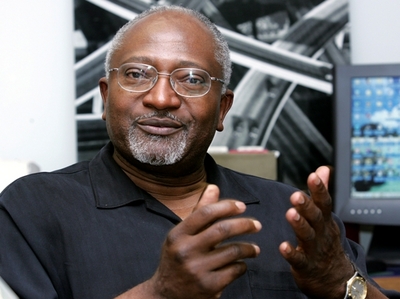Dillard University's Deep South Center for Environmental Justice and Texas Southern University Barbara Jordan-Mickey Leland School of Public Affairs convened the Third Annual HBCU Student Climate Change Conference in New Orleans March 26-29. More than 200 students and faculty mentors from 19 historically black colleges and universities (HBCUs) and community-based organization leaders attended the four-day event. Most of the attendees came from climate-impacted communities in the five Gulf Coast states. Forty-three HBCUs are located in the Gulf Coast region: TX (9), LA (7), AL (15), MS (8), and FL (4). The conference is a project of the larger HBCU/Community Climate Change Consortium, a collaboration of historically black colleges and universities (HBCUs) and community based organizations (CBOs) in ten Gulf Coast and South Atlantic states, the District of Columbia and the Virgin Island. The consortium was launched in 2013 and is designed to train the next generation of leaders, address climate vulnerability and build community resilience.
Residents in the Gulf Coast and South Atlantic region face challenges of extreme poverty, racial segregation, severe income inequality, stagnant economic mobility, health disparities, high rates of uninsured and limited access to expanded Medicaid for the poor under Obamacare, no cars and poor public transit, and lack of access to healthy foods and full-service supermarkets, parks and green space. Clearly, place matters for healthy people and healthy communities. Unfortunately, zip code is the best predictor of individual and community health. And not surprising, the 2014 Annual Health Ranking has the South at the bottom and lagging in health.
Many of the communities in the "unhealthiest states" are home to a large share of the nation's chemical plants, refineries, dirty coal plants and other polluting industries--combined with segregation routinely places African Americans and other people of color at elevated health risk. These health equity, environmental and climate justice challenges are especially problematic for children in schools located in the "vulnerability zone." The problem is most acute in communities of color along Louisiana's Cancer Alley, Houston Ship Channel and other communities on the Gulf Coast that are at ground zero in the fight for environmental and climate justice.
The conference kicked off with a "toxic tour" of several climate-vulnerable New Orleans neighborhoods that gave participants a chance to see firsthand recovery and redevelopment challenges facing the city's African American community--nearly a decade after Hurricane Katrina struck in 2005. Flooding from the levee breach drowned 80 percent of New Orleans and its three HBCUs (Dillard University, Xavier University and Southern University at New Orleans). The first stop on the tour was the site of the old Booker T. Washington High School (the city's first high school built for African Americans) built atop a dumpsite--Silver City Landfill. Now the New Orleans Recovery School District is proposing to build a new school on the contaminated site--against the wishes of the community residents and it civil rights and human-rights allies. The new school would replace soon-to-be-closed Walter L. Cohen High School, located in the racially diverse Uptown neighborhood that was spared flooding after Katrina. However, the new school site is contaminated with lead, arsenic, chromium, mercury, barium and other heavy metals in the soil.
The second stop on the tour took conference attendees to another black neighborhood where homes in Press Park and Gordon Plaza and the Robert Moton Elementary School [insert photo] were built on top of yet another waste dump--the Agriculture Street Landfill. Impacted residents had been waiting more than two decades for environmental and economic justice in their class action lawsuit. And on February 25, 2015, District Judge Tiffany Gauthier Chase approved the class-wide settlement of the case.
Consortium members decided to make inequality, health equity, environmental and climate justice, and community resilience major priorities of their institutions and communities going forward. They also reaffirmed a commitment to help build a strong southern initiative to address skyrocketing inequality, disparities in healthcare and health disparities, social vulnerability and promote authentic community-resilience planning, and intergenerational organizing and leadership development since the vast majority of their constituents are located in the climate-vulnerable South, a region also known for conservative politics and climate-change deniers--even though the region has received more than its share of climate-related disasters. The Southeast U.S. for the period 1980-2012 had more billion-dollar disasters than the rest of the country combined.
Conference conveners conducted workshops and hands-on training in preparation for an HBCU-led delegation to participate in the United Nations Conference of the Parties (COP21) Paris climate summit set for November 30 through December 11. It is important that youth, students and leaders from climate-vulnerable communities participate in conferences and policy summits and speak for themselves in New Orleans and on the road to Paris and beyond.
It's take funding to do this work. Consortium members developed a 6-month fund-raising plan to ensure a diverse number of students/faculty mentors and CBO leaders engage in on-the-ground activities leading up to COP21 in Paris. The core staff of Dillard University and Texas Southern University have taken the lead in coordinating with national African American-led organizations and majority white environmental groups, foundations and others who have expressed an interest in diversity and supporting racial justice, and black youth/student leadership development. We welcome their financial support and assistance and look forward to growing our partnerships and collaborations beyond Paris.
Dillard University's Deep South Center for
Environmental Justice and Texas Southern University Barbara
Jordan-Mickey Leland School of Public
Affairs
convened the Third Annual HBCU Student Climate Change Conference in New Orleans on March 26-29.
More than 200 students and faculty mentors from 19 historically black colleges and universities (HBCUs) and community based
organization leaders attended the four-day event.
Consortium members
developed a 6-month fund-raising plan to ensure a diverse number of
students/faculty mentors and CBO leaders engage in on-the-ground activities
leading up to COP21 in Paris November 30 thru December 11, 2015.





